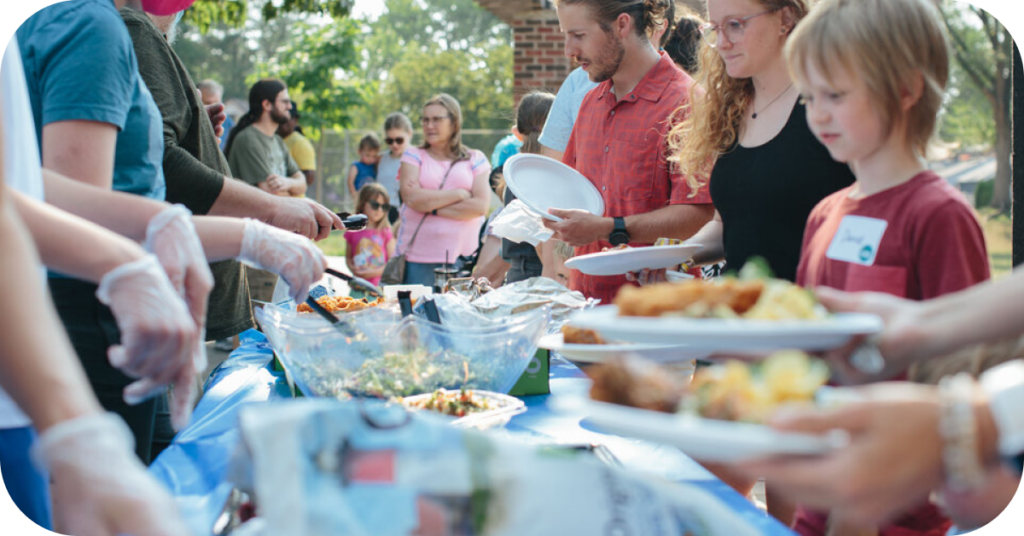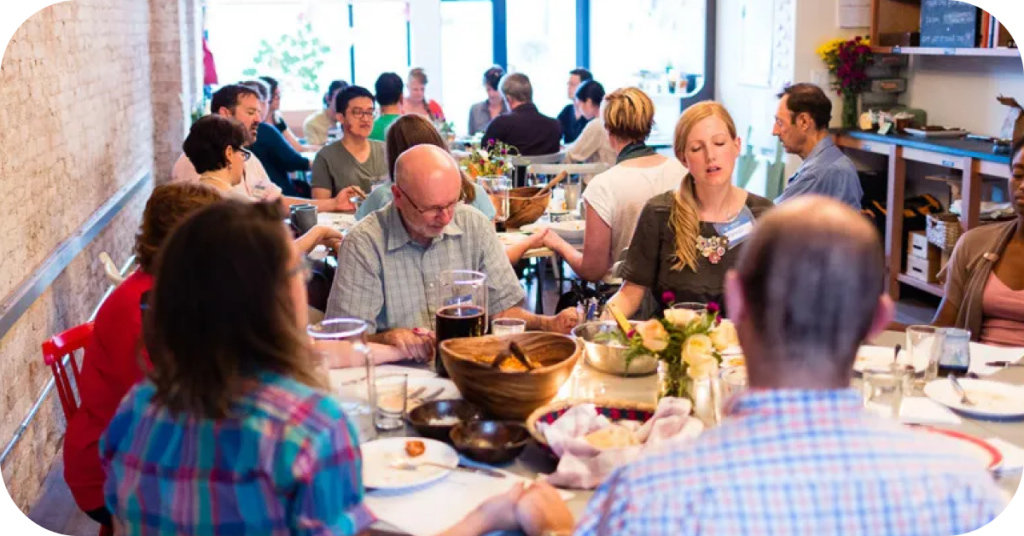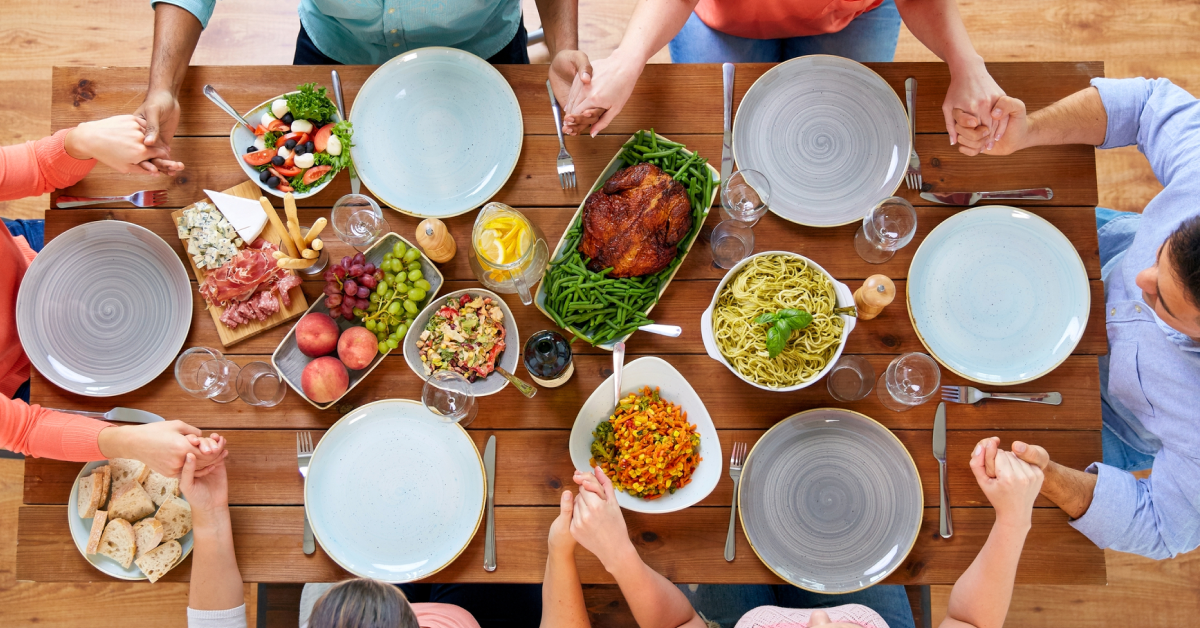Imagine you show up for church one Sunday – at a park. Instead of pews and a stage, you’re greeted by community tables, a generous meal, live music, and a crowd. Some of the faces are familiar; many are strangers, community members who may have never attended church in their life, who were drawn in by the very oddness of the event in all its welcoming warmth.
You make a bit of small talk, sit down to eat, and listen while the musician off to the side introduces each song. Kids weave through the crowd until someone gently ushers them in for a story and lesson. As folks finish their last bites, someone else finds their way to a microphone and guides the group through a gospel story, some discussion, prayer, and communion.

You’ve just experienced one of the many Fresh Expressions of church springing up across the globe: the mission-oriented and relationship-based Dinner Church.
One of the Pivot Podcast’s recent guests, JD Larson, was able to provide us with a unique perspective on the Dinner Church model. A Seeds Fellowship alum, JD and his wife, ChristianAnn, co-pastor North City Church in North Minneapolis – where the weekly Sunday gathering centers around a large community meal in a local park or community center, rather than sermons and songs from a stage. JD is also the Coordinator of Community Development for the Dinner Church Collective.

This photo was taken at North City Church’s “Big Neighborhood Dinner Table,” one of their community dinners that exemplify the dinner church model as a Fresh Expression of church.
Prioritizing Community and Connection: The Story of North City Church
So what is Dinner Church?
JD acknowledges that he’ll provide two slightly different responses to this question, depending on who’s asking:
· A Christian neighbor? “Our church gathers around tables and a big community meal – that’s just how we do church.”
· A friend or neighbor who isn’t an active churchgoer? “It’s a big community dinner, where all are welcome! There’s music, good food, good conversation, a story about Jesus, and some focused discussion about deeper life topics.”
In essence, JD shares, it’s a community meal open to the neighborhood. It’s hosted by the church – but more than that, it is the church. Harkening back to the agape feasts of the New Testament and early church, it’s a food-centered gathering where all are welcome and where Christ is present.
It’s dinner, and it’s church.

This is a photo of North City Church’s core leadership team, who committed to the Dinner Church model as the primary way they would gather.
When JD and ChristianAnn started North City Church in the Fall of 2019, it began as a typical urban church plant, featuring a Sunday morning service centered on sermons and contemporary worship. Their core leadership team soon began discussing how to incorporate more community gatherings into their rhythms, pointing to Jesus and his constant sharing of meals as the ultimate example of how to gather and be the church.
After exploring potlucks and brunches, and then weathering the storm of the pandemic at its peak, the team committed to trying out the Dinner Church model. They initially planned to hold a meal-centered church gathering every fifth Sunday during the summer of 2021, but the group quickly ballooned with newcomers, and by the fall they pivoted to the Dinner Church model full-time.
“[When we functioned as a traditional church,] we were pretty good at gathering Christians who were looking for a new church. We weren’t particularly good at engaging with neighbors who weren’t interested in church, or who hadn’t been to church in a long time. [Since becoming a Dinner Church] that dynamic has dramatically shifted.”

A group of people gather around a table to eat and fellowship at St. Lydia’s dinner church.
The Theology of Dinner Church: Four Presences at the Table
JD describes the four participants that each member of his church theologically contemplates and focuses on as essential to the Dinner Church model:
- Your authentic self.
- Your brothers and sisters in Christ.
- Jesus.
- Your neighbor, the stranger.
By fully embracing these four presences, JD believes that a unique space is created where church members can come together and share their vulnerable selves. They do so with the understanding that no one’s spiritual journey is a solo experience, and that they’re all on a mission to serve God together. They’re also aware of the powerful presence of Jesus and prioritize creating an atmosphere of acceptance and inclusivity for those seeking God, regardless of their background or beliefs.
“And when God’s presence is thick in the room, when we bring out our authentic selves, when we’re there with the beloved community and we engage and create a welcoming space for the stranger, there’s something deeply, profoundly theological that happens. There’s something deeply transformational that happens.”
As a third space, Dinner Church provides an inclusive setting for community-building, where participants are able to explore who they are outside of their usual contexts of home (the “first space”) and work (the “second space”).
Rediscovering Food-Centered Faith: How the Discipleship Practices of a Mission-Oriented Dinner Church Benefit the Community
So what are the benefits of this unique, community-oriented church model?
- The creation of a “third space.” As a third space, Dinner Church provides an inclusive setting for community-building, where participants are able to explore who they are outside of their usual contexts of home (the “first space”) and work (the “second space”). Dinner Church creates a sacred moment within that third space for its members and visitors by unconditionally welcoming the whole neighborhood in to eat, fellowship, and be. For many newcomers, this space is so different from any church experience they may have had before that there’s a distance from any historical baggage they might bring to a traditional church.
- The natural presence of relational discipleship. At North City Church, conversation flows naturally when people come together to share a meal. Church leaders gently guide the discussion with thoughtful prompts and encourage everyone to listen attentively. To further strengthen these connections, the church also hosts small group meetings on other days. This layered approach adds depth to the sense of community and allows for more intimate conversations.
- The automatic orientation towards mission and connection with the surrounding community. While most churches prioritize worship and sermons while hoping mission and community connection occur naturally as an overflow of those things, Dinner Church flips the script. “We prioritize mission in the way that we gather ourselves,” says JD, “Not forsaking connection with God or connection with the other… We’re doing mission [and connection with the neighborhood] on Sunday, and we want to equip people as disciples throughout the rest of the week.”
“There’s nothing more discipleship-focused than having to contextualize your relationship with Jesus and your faith in a conversation with a stranger. So it’s not like mission is separate from discipleship. [This integration of mission and discipleship] is actually something that’s been lacking in the church for many years.”

Welcoming Faith Conversations: Approaching Non-Christians Without Anxiety or Judgment
One of the biggest surprises JD has encountered during his time leading a Dinner Church? How bad humans in general can be at talking to strangers, especially in the wake of the pandemic.
“Conversations are tough, and I think I’ve learned how hard it is for Christians to talk with non-Christians. And I have been surprised how that is a skill that needs to be taught and developed… That’s been a learning curve.”
JD points to the intentional work his church has done around maintaining a non-anxious presence during encounters with people of other backgrounds and worldviews around the table. He also emphasizes the value they’ve found in training church members in active listening skills.
So how can Christians improve their conversational and listening skills in this way?
Check out a few of our resources on the topic:
- Becoming a Listening Presence
- How to Listen to Spiritual Stories
- A Space of Spiritual Honesty
- A Natural Bridge
Following the Call: Jesus’ Community-Building Practices
Whether you are a ministry leader looking to jump into (or dabble your toes in) the Dinner Church model, or an everyday believer looking for ways to build relationships and share God’s love with your community, the experience of North City Church and other community-rooted Fresh Expressions of church can provide a wealth of examples to follow.
Here are a few final, key questions for you to reflect on as you consider stepping into the community-building practices of Jesus:
- When you think about your connection to God, to your faith community members, and to your neighborhood and community at large – where are the connections strongest? Where are they weakest? What needs to change?
- Are you comfortable engaging in conversation with folks outside your community in a non-anxious, non-judgmental way? How are your listening skills?
- How might Dinner Church practices and attitudes be incorporated into your personal walk of faith, or that of your church?
Looking for a deeper dive into the ins and outs of the Dinner Church model? Listen to the podcast, check out the Dinner Church Collective’s resources, and feel free to reach out to JD for more intentional learning or coaching.



